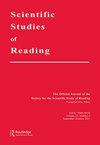慢即是快:花在解码新单词上的时间预示着更好的解码和更快的增长
IF 2.9
2区 教育学
Q1 EDUCATION & EDUCATIONAL RESEARCH
引用次数: 2
摘要
我们比较了表现不佳和表现正常的解码器在真实单词、伪同音异义词和非单词上的处理时间(研究1),并评估了处理时间差异与解码发展速度的关系(研究2)。800多名六年级和七年级学生连续三年进行了四次在线阅读组件测试,其中包括解码测试。研究1表明,较差的解码器在处理真实单词和伪同音异义词时通常比同龄人慢,但在解码对他们来说陌生的非单词时花费的时间比同龄人短,导致了显著的交互作用。在研究2中,纵向模型显示学生解码新单词的时间正向预测解码发展。这些结果与糟糕的解码器可能陷入恶性循环的假设是一致的:糟糕的解码技能加上花在解码新单词上的时间较少,会干扰解码的发展。本文章由计算机程序翻译,如有差异,请以英文原文为准。
When Slower is Faster: Time Spent Decoding Novel Words Predicts Better Decoding and Faster Growth
ABSTRACT We compare poor-performing and normal-performing decoders’ processing times on real words, pseudo-homophones, and nonwords (Study 1), and evaluate how a processing time difference is associated with rates of decoding development (Study 2). Over 800 sixth and seventh graders took an online reading component battery, which included a decoding test, four times in three consecutive years. Study 1 indicates that poor decoders were generally slower than their peers in processing real words and pseudo-homophones, but they spent shorter time than their peers when decoding nonwords that were novel to them, resulting in a significant interaction. In Study 2, longitudinal modeling reveals that the time students spent decoding novel words positively predicted decoding development. These results are consistent with the hypothesis that poor decoders may be trapped in a vicious cycle: poor decoding skill combined with less time spent attempting to decode novel words interferes with decoding development.
求助全文
通过发布文献求助,成功后即可免费获取论文全文。
去求助
来源期刊

Scientific Studies of Reading
Multiple-
CiteScore
7.20
自引率
2.70%
发文量
26
期刊介绍:
This journal publishes original empirical investigations dealing with all aspects of reading and its related areas, and, occasionally, scholarly reviews of the literature, papers focused on theory development, and discussions of social policy issues. Papers range from very basic studies to those whose main thrust is toward educational practice. The journal also includes work on "all aspects of reading and its related areas," a phrase that is sufficiently general to encompass issues related to word recognition, comprehension, writing, intervention, and assessment involving very young children and/or adults.
 求助内容:
求助内容: 应助结果提醒方式:
应助结果提醒方式:


